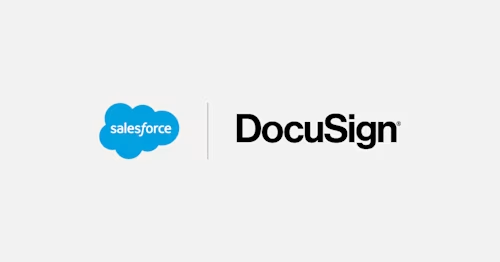
Salesforce y Docusign se unen para permitir la colaboración contractual a través de Slack
Salesforce y Docusign anunciaron nuevas soluciones conjuntas para aumentar los ingresos de los clientes y crear experiencias de cliente de manera digital

Salesforce (NYSE: CRM) y Docusign (NASDAQ: DOCU) anunciaron hoy una expansión de su asociación estratégica global para construir nuevas soluciones conjuntas que hagan más sencillo a los clientes acelerar la forma en que se facilitan los acuerdos en todo el mundo. Las nuevas innovaciones automatizarán el proceso de contratación con soluciones inteligentes basadas en IA que mejorarán la experiencia del cliente al preparar, firmar y gestionar acuerdos, impulsar un ROI más rápido y aumentar la colaboración entre las organizaciones con las funcionalidades de Slack.
Juntos, Salesforce y Docusign han ayudado a organizaciones de todos los tamaños a hacer negocios más rápido durante más de 10 años. Hoy en día, decenas de miles de clientes utilizan las integraciones de Salesforce y Docusign para optimizar sus procesos de acuerdo, aumentar la productividad de los empleados y acelerar el tiempo de obtención de valor.
Nuevas Innovaciones
Las empresas deben maximizar la productividad y la colaboración en un mundo totalmente digital, que trabaja desde cualquier lugar. Salesforce y Slack permiten a las organizaciones construir su sede digital al mejorar la colaboración de los empleados a través de los límites de la organización y con clientes y socios, sin importar dónde, cuándo o cómo trabajen. La asociación ampliada de Salesforce con Docusign ofrecerá nuevas formas de facilitar a los clientes la preparación de contratos, cotizaciones y facturas, el seguimiento y la ejecución de los términos del contrato y la gestión del ciclo de vida del contrato (CLM) de forma completa, sin problemas en las plataformas Docusign, Salesforce y Slack. Las nuevas aplicaciones se diseñarán y desarrollarán conjuntamente de forma nativa en Salesforce Customer 360:
Colaboración en acuerdos desde las plataformas Docusign y Slack: Esta integración tiene como objetivo acelerar el proceso de colaboración de acuerdos más amplio para los clientes directamente desde Slack. Los nuevos flujos de trabajo notificarán a los equipos sobre el progreso del acuerdo y los elementos de acción, lo que les permitirá trabajar rápidamente para revisar, editar, monitorear y ejecutar acuerdos, sin salir de su sede digital. Docusign eSignature for Slack ya está disponible; Docusign CLM para Slack estará disponible en 2022.
Docusign Gen para Salesforce Billing: Los clientes pueden cerrar, facturar y reconocer los ingresos más rápido a través de facturas de marca, directamente dentro de Salesforce Billing con plantillas configurables. Los clientes también pueden programar la generación y entrega de facturas por lotes o generar una factura bajo demanda, lo que garantiza más pagos a tiempo y menos problemas de servicio al cliente. Docusign Gen for Salesforce Billing ya está disponible.
Docusign Gen para Salesforce CPQ Plus: Los clientes pueden generar automáticamente acuerdos profesionales y personalizables desde Salesforce con solo unos pocos clics. Todo el proceso se puede configurar y controlar desde Salesforce, ahorrando tiempo a los clientes, eliminando errores y acelerando el camino hacia los ingresos. Docusign Gen for Salesforce CPQ Plus ya está disponible.
Docusign CLM para Salesforce Field Service: Los clientes podrán automatizar la gestión de obligaciones mediante el seguimiento, la aplicación y la actualización de los términos clave del contrato en todos los departamentos. Las obligaciones y los términos de los contratos ejecutados, como las garantías y los acuerdos de nivel de servicio (SLA) se asignan a los objetos contractuales de Service Cloud. Esto permitirá experiencias de servicio más inteligentes y automatizadas, y una ejecución eficiente de los contratos de servicio. Docusign CLM para Salesforce Field Service estará disponible en 2022.
"Nuestra asociación con Docusign permite a nuestros clientes tener éxito en todo lo digital, trabajar desde cualquier lugar del mundo", dijo Ryan Aytay, Chief Business Officer, Salesforce. "Juntos, estamos permitiendo a nuestros clientes optimizar los flujos de trabajo de contratos comerciales, reducir costos y aumentar la productividad en la nueva sede digital".
"Salesforce ha sido un socio esencial durante más de una década, ya que nuestros clientes conjuntos han estado transformando su negocio digitalmente. A medida que profundizamos nuestra asociación, estamos entusiasmados de ofrecer a los clientes nuevas formas de resolver los desafíos emergentes desde cualquier lugar al llevar sus procesos de acuerdo e inteligencia de acuerdos al Customer 360", dijo Scott Olrich, COO de Docusign.
Para obtener más detalles sobre la asociación, visite:
Publicaciones relacionadas
Docusign IAM: la plataforma de acuerdos que tu negocio necesita




